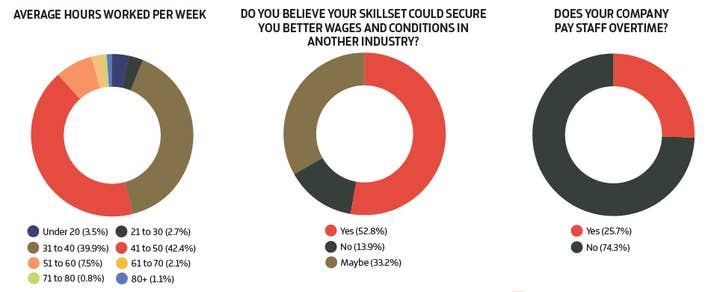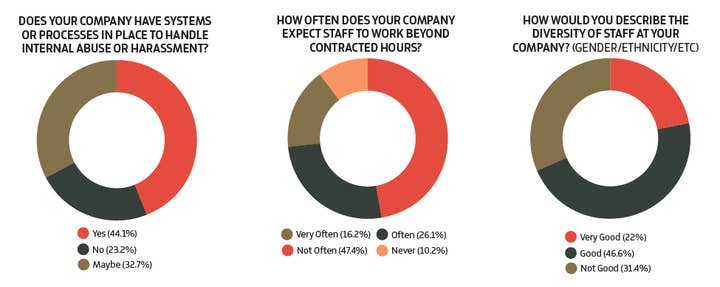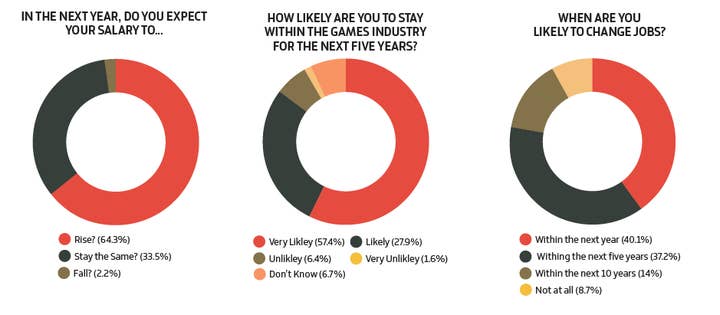The GamesIndustry.biz Careers Survey: An industry driven by passion, not pay
How big is the gender wage gap? How high is the industry staff turnover? Our findings are revealed
Earlier this year, we conducted our first careers survey, calling on the industry to share its thoughts on working conditions, pay, diversity and more - and all with the promise of complete anonymity. The results are now in.
Firstly, despite the rise of bedroom coders, the majority of participants still work for established companies. Only 15.8% claimed to be self-employed. More than a third (37.8%) are employed by firms with over 200 staff. Just under a quarter work at companies with 11 to 50 employees, while micro studios of two to ten staff were home to just over 15% of respondents. Only 3.8% are "one person teams".
"Just under half (46.6%) of our respondents described the diversity of their team as 'Good', with a further 22% describing it as 'Very Good'"
It will come as no surprise, though perhaps as a disappointment, that these companies are predominantly staffed by men. Just under half (46.6%) of our respondents described the diversity of their team - encompassing gender, ethnicity, sexuality and more - as "Good", with a further 22% describing it as "Very Good". However, this still means almost a third (31.4%) of our survey group believe staff diversity to be "Not Good".
Fortunately, more people expect diversity to improve in 2017. 28.6% believe their company will expand their team to encompass a broader variety of people, while 25.1% do not.

Thanks to this increasingly connected world we live in, a little over one in ten respondents (11.5%) actually work remotely. Of these, 13.9% work for companies based in another country.
Interestingly, one in ten people also hold a second, non-games industry job. Most of these (62.5%) are developers, further proving that the ongoing democratisation of engines and other tools mean there is scope for people beyond our industry to explore games as a hobby or a potential career.
PUTTING IN THE HOURS
The vast majority of survey participants (over 80%) work between 30 and 50 hours per week, which is not too far from the typical eight-hour day, 40-hour week seen in other professions. However, one in ten works more than 50 hours - with four people claiming to work more than 81.
"Approximately 90% of respondents are expected to work beyond their contracted hours - but only one in four say they are paid overtime"
More concerning is that approximately 90% of respondents are expected to work beyond their contracted hours, with 16.2% going as far to say they're called upon to do so "Very Often". Despite this, only one in four say they are paid overtime.
Looking closely at the two largest groups, 88.8% of developers are expected to work overtime but only 29% are paid for it. Meanwhile, a staggering 92.3% of people employed by publishers work beyond their contracted hours, but only 12.8% are paid overtime.
The possible reasons for overtime could range from event attendance to launch parties. However, in an industry that can't shake horror stories of crunch conditions - something mentioned by 20% of participants when asked what the worst part of working in games is - these figures make for alarming reading.
At this point, it's worth taking a look at average salaries across the industry. To establish these figures, we discounted anyone earning less than £14,000 (which draws us close to contractor territory, where some people are only paid a few thousand per annum) or more than £100,000 (to avoid executive salaries skewing the results).

The mean average earnings for our entire group is £38,797, with the median average a little short of that at £38,000.
Thanks to the influx of developers and publishers that took part, we're also able to work out averages for these sectors. Developers are roughly in line with the overall figures, with a mean average of £38,181 and a median of £38,000. The average employee on the publishing side, however, is ahead of this curve: the mean for this group was £46,226, with a median of £40,000.
Frustratingly, there continues to be a wage gap between the genders, although this is by no means a problem exclusive to the games industry.
"The mean average salary for women is almost £7,000 short of the £40,090 earned by the average male respondent"
The mean average salary for women that took part in our survey is £33,274 - almost £7,000 short of the £40,090 earned by the average male respondent. This gap shrinks slightly to £5,000 when you look at the median, which stands at £30,000 for women and £35,000 for men.
Looking closer at our surveyed audience, it appears there a fewer women than men in higher-earning senior and executive positions. Only 11% of female respondents earned over £60,000, while 20% of male participants were above that paygrade. In fact, the most any woman who took part in our survey brought home was £130,000 - considerably less than the highest earning male at £980,000.
In better news, it appears much of the industry is confident about receiving a pay rise in 2017. 64.3% believe their salary will increase this year, while 56.3% said they received a wage boost in 2016. Only 2.1% expect to take a pay cut before the year is out - although one in 20 respondents claimed their salary fell during the last twelve months.
BENEFITS STREET
When quizzed about additional benefits, most respondents seem to be well supported. More than half (52.3%) said they are offered skills and training if they wish to improve themselves, while almost three quarters of our participants (73.3%) have the option of flexible working hours. 28% are given more than the standard maternity or paternity pay.
63.2% confirm they are offered other perks in their job, including bonus pay, various forms of healthcare, shares and revenue reward schemes, pensions, meal tickets, gym memberships, on-site catering, company smartphones, free video games and - in one case - biscuits.
"Almost half of our respondents say they are actively encouraged to work on personal projects. More than half report their employers do not claim ownership of said projects"
In an industry as inventive as video games, companies are increasingly taking steps to allow staff to flex their creative muscles, particularly in the development space. Almost half of our respondents (44.7%) say they are actively encouraged to work on personal projects. Thankfully, an even larger proportion (53.8%) report their employers do not claim ownership of said projects, with 19.2% saying they do and the rest unsure.
On a more serious note, there have been scattered reports of abuse and harassment in the workplace in recent years - but fortunately 44.1% of our respondents confirm their company does have internal systems and processes in place to deal with this. Although clearly that still needs to be higher.
When asked how often these processes have been required in the past three years, 54.9% of respondents didn't know, while one in four said these systems are never needed. However, just over 5% said internal abuse needed to be dealt with "Often" or "Very often".
JOB PROSPECTS
The games industry seems to be one of high staff turnover, with well over half our respondents (63.3%) working in their current job for between one and five years, and one in four only starting within the last 12 months. No-one claimed to be working the same job for over 20 years, and only 1.3% had worked more than 11.
More interesting was that two out of five participants expected to be seeking new employment in 2017, including 35.9% of developers, 51.2% of publishing staff, 30.2% of remote workers and eight out of 11 media professionals.
"The majority said a higher salary would be the primary motivation for moving to a new role or company"
The vast majority said a higher salary would be the primary motivation for moving to a new role or company, with other answers including the chance of promotion, the desire to set up their own company, boredom with their current company, and the opportunity to work abroad. In fact, well over half of our respondents (64.4%) said they would be tempted to relocate overseas.
It's a good job so many people hope to look for work because three out of five respondents expect their company to be increasing its headcount in 2017. A little more than this (63.8%) said their teams grew last year as well. Just under a third (31.9%) expect their staff numbers to remain flat this year, while only 7% expect consolidation. More than one in ten (13.9%) reported their company made job cuts in 2016.
When looking for new employment, just over half of our survey participants (52.8%) believe that their skills and experience would secure them better pay and working conditions in another industry, with only 13.9% disagreeing (the rest settling for "Maybe").
But clearly this is an industry driven by passion and creativity rather than people chasing bigger paychecks, as only 1.6% of respondents consider it "Very Unlikely" they will be working in video games in five years' time. More than a quarter (27.9%) believed it "Likely", while more than half (57.4%) said it was "Very Likely" they'll be sticking with the video games industry.

Our Methodology
GamesIndustry.biz conducted this study through an online survey in which participants were anonymous. We received 373 responses from around the world. 21.4% of our respondents were female, which is in keeping with the industry gender split as shown by numerous external studies.
While we invited people from all corners of the industry to share their thoughts, it should be noted that 259 respondents (69.4%) identified as developers. The next largest group, publishers, accounted for 10% of all participants, while the rest were spread across media, PR, consultants, retail, education and academia, as well as tools and service providers.
The vast majority (over 80%) were aged 40 or less, which reflects the young nature of the business. No-one that took our survey was over 61, with 10% aged between 41 and 50 and only three people older than 51.
Just under half of respondents (47.2%) were based in the UK, with the rest hailing from all over the world. The second and third largest territories were North America and Western Europe at 22% and 15% respectively. However, there are still notable results from regions such as the Nordic countries (4%) and Asia (3.8%).
